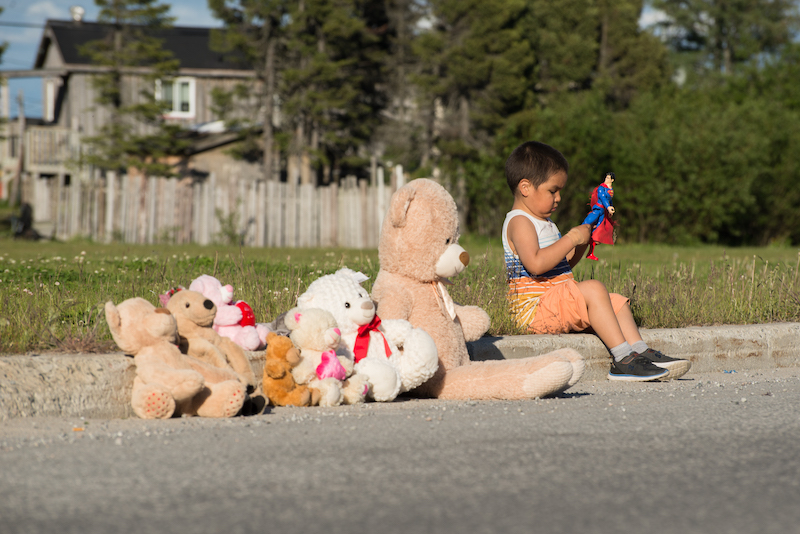As the number of undocumented graves of former residential school students continues to climb across Canada, Indigenous communities have been coming together to grieve and seek solace in ceremony.
The Cree Nation respectfully invited Eeyou Istchee communities to stand in solidarity with residential school victims and survivors by taking down their Canadian flags for the month of July and wearing orange on Canada Day.
“These past few weeks were a sombre reminder of this country’s not-so-distant past and clearly demonstrates the need for Canada to deal with its colonial past before we can collectively heal as a Nation,” stated Grand Chief Abel Bosum. “It is also our hope that during this time we can begin to reflect upon our collective actions as we respond to these troubling revelations so we can move forward and find ways for our communities to heal.”
As Quebec’s first two residential schools were located at Chisasibi’s former location on Fort George Island, Chief Daisy House called on governments and churches to share their records about the children who attended these and other schools to bring a sense of healing and closure. Plans are ongoing to search the former school sites on Fort George Island, supported and guided by local Elders groups.
“The youth council in my community has requested that Canada Day activities be cancelled this year, as a way to honour both the children who never returned home as well as the survivors who still carry the scars,” House shared. “We have heard survivors share horror stories about their experiences in residential school and it is not a surprise that many of these heroes have taken their stories to their graves.”
The calls to dampen Canada Day celebrations followed the discoveries of 215 unmarked graves at a former residential school in Kamloops, BC, as many as 751 graves at Marieval Indian Residential School in Saskatchewan, and another 182 grave sites discovered by the ʔaq̓am community at the St. Eugene’s Mission residential school near Cranbrook in southern BC.
“You can never fully prepare for something like this,” Chief Jason Louie of the Lower Kootenay Band, a member of the Ktunaxa Nation, told the CBC. “We were robbed of future Elders. Those children, if they had not passed away, could have been Elders and teachers in our communities, the keepers of knowledge. It’s devastating.”
By the time of this last announcement on June 30, calls had steadily been growing across the country to cancel Canada Day celebrations the following day. Several cities and organizations muted their celebrations entirely while several others revised their plans to reflect a more sombre mood.
Thousands of people marched in various cities to honour Indigenous children impacted by residential schools, many wearing orange and carrying signs declaring sentiments such as “no pride in genocide.”

When discussing the tragic discovery in Kamloops at a meeting to plan their next events, the Chisasibi Youth Council had determined it wasn’t the right time to organize their typical festivities for Canada Day.
“We thought it was time to take a pause on celebrating Canada Day,” said Chisasibi Youth Chief Steven Tapiatic. “When someone passes away or there’s a death in the community, we usually shut everything down on that day of the funeral to show respect for the deceased and the family affected.”
The Chisasibi Youth Council led the community’s candlelight vigil June 30. With cultural and spiritual guidance from local Elders, a sacred fire was lit for two nights ending July 1 at 11:59 pm, with tobacco available for offerings.
“A lot of members in our Youth Council felt sad, angry and confused or lost because many of my members have children who are three to five years old,” Tapiatic told the Nation. “When they heard that the youngest body found was three years old, it really hit home for them. They couldn’t imagine their kids leaving and never coming back and never knowing what happened.”
As community radio station CHFG broadcast live from the Mitchuap fireplace, Reverend Jacob Sealhunter led the ceremony alongside the Heart of the Land drum group and a speech from Chief Daisy House. Yellow hearts marked a map of the community sidewalk, where residents were encouraged to meet with their candles, stuffed animals and radios to listen to the broadcast. They also encouraged people to bring out their Elders and help them get comfortable.
“It’s opening old wounds from residential school survivors, but we are a very strong community,” said Tapiatic. “Parents are having a hard time explaining what happened to kids – there’s no guide on how to talk about what’s happening right now. The best way for us in Chisasibi is prayer and drumming.”

Tapiatic explained that the Council’s intention isn’t to disrespect to Canada or Canada Day, but rather to devote their energies to coming together “to find guidance and support for our people to truly heal from what is happening right now.”
Chisasibi wasn’t the only community to commemorate the impact of the residential school legacy. At their community saaptuan, Ouje-Bougoumou hosted a candlelight vigil June 30. Nemaska also hosted a community event July 1 called “Honouring Our Children & Youth Day”, which featured an “arrival by canoe re-enactment” and candlelight vigil in addition to summer games and fireworks.
Whapmagoostui resolved that instead of celebrating Canada Day, a special day would be observed on July 2 to honour residential school survivors and those who never made it home. The northernmost Cree community also held a “remembrance walk for the lost children” on July 1. Orange shirts were given out and lunch served after the walk.
“Since we felt it was inappropriate to celebrate Canada this year, we decided to dedicate this July 1 to our children and our youth,” stated Chief Clarence Jolly. “We will also honour our Cree strength, our resilience, and remember the lives of the ones who unfortunately did not come home.”





